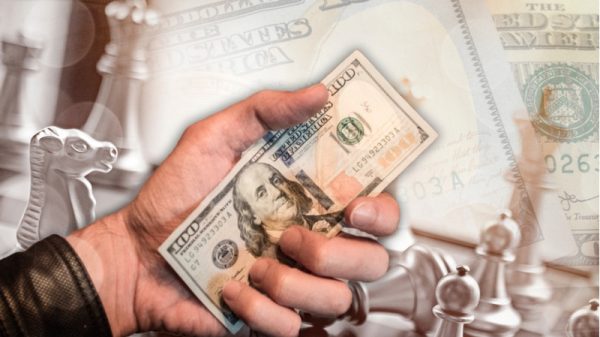Last month’s Republican convention was an energetic, enthusiastic celebration of Donald Trump, the party’s presidential nominee for the third contest in a row. But even as it marked one of Trump’s strongest electoral positions to date and his strongest grip on the GOP, there were signs that perhaps that strength was fragile.
Several of those offering testimonials on Trump’s behalf, for example, were people employed at Trump Organization properties. There were more people on Trump’s corporate payroll there to tout his candidacy than there were former Republican presidents or presidential candidates.
The simple reason for this is that Trump had been successful in winnowing the party down to the most Trump-loyal elements. Some of this was intentional, Trump demanding their ouster for whatever reason and Republican leaders or voters obliging. A lot of it, though, was that Trump has been at this for nine years, barreling ahead into politics and knocking over more and more people each year. The Wall Street Journal’s Peggy Noonan generously described the solipsism of the Republican convention as being what happens when you “cast your history aside.” A bowling ball is not casting aside the pins’ history.
Since it became obvious that Trump would again be the Republican nominee (in about the middle of last year), it seemed equally obvious that 2024 would again center on the same question that had defined 2016 and 2020: Should Trump be president? In 2016, he had the advantage of novelty. In 2020, he had the advantage of incumbency, manifested mostly in a big, loyal base of support. In 2024, he had the advantage of inertia.
At least at the beginning.
Vice President Kamala Harris’s speech concluding the Democratic convention on Thursday night concentrated the arguments being offered by her party over the course of the event. It was familiar in form — outlining policy goals in optimistic terms and undercutting her opponent in withering ones. But this was not the speech that President Joe Biden would have given had he still been the candidate, even if much of the convention would otherwise have been similar.
There would still have been a steady rotation of Trump critics, certainly. Hillary Clinton tried this approach in her 2016 campaign, but at that point warnings about how Trump might govern were purely speculative. In 2024, there is a long line of people willing to speak out against sending Trump back to the White House: his former press secretary, former administration staffers, Republican elected officials, Republican voters. Trump’s effort to retain power after losing in 2020 was part of this, certainly, but part of it was simply the accretion of people stepped on and over as Trump seized power.
What Harris did that Biden couldn’t was step out of the clinch in which the two parties had been entangled. Biden’s campaign was focused on combating Trump on Trump’s terms, depicting the election as a struggle between two forces pulling in opposite directions, one toward democracy and the other toward authoritarianism. With the transition to Harris, the Democrats simply dropped the rope. Vice-presidential nominee and Minnesota Gov. Tim Walz pointed at Trump tugging away and declared it weird. Harris, in her speech on Thursday, saw Trump huffing and puffing and rejected him as “unserious.”
Instead of treating Trump as an equal force in the system, the Democrats are now treating him more like a virus. It is hard to overstate the extent to which this is facilitated by the other way in which Trump’s enduring presence has reshaped American politics: the big, sturdy echo chamber in which he and his supporters exist. The right has been in a bubble for some time, but Trump strengthened and refocused it. Allies like Elon Musk helped; Musk turned his social media platform X into a literal economic engine for the fringe right rather than just an engine for attention. The bubble grew more insular and isolated, making it easier to treat as exceptional instead of as integrated.
Harris was direct in articulating the threat many Americans see in Trump, including his authoritarian tendencies.
“I will not cozy up to tyrants and dictators like Kim Jong Un, who are rooting for Trump,” she said at one point, “who are rooting for Trump because they know he is easy to manipulate with flattery and favors. They know Trump won’t hold autocrats accountable because he wants to be an autocrat himself.”
The difference is that this rhetoric lands differently from outside the fray than from within it. It’s like those old cartoons in which Bugs Bunny is swarmed by enemies, a big circular dust cloud emerging with various fists and feet emerging at odd angles. Then Bugs, munching a carrot, steps out of the ongoing tussle. A shrug at the audience through the fourth wall and a thumb jerked toward the tumult. Look at these joiks.
Biden was still in that tussle. He couldn’t step outside of the fight because Biden was the avatar of the way the Democrats had dealt with Trump from the outset. When he left the race last month, that whole style left with it. Everyone could feel it. It was about Biden’s age, but it was about the age of the party’s rhetoric, too. Harris feels like the challenger rather than a representative of incumbency in part because hers is the new approach to the stalemate.
The convention’s mantra that “we aren’t going back” was obviously a reference to Trump’s administration. It was also obviously about Trump’s regressive view of the country, a response to the idea that he will “make America great again,” meaning that he aims to unwind some of the country’s progress. Harris’s phrase is a defense of America’s pluralism in the face of Trump’s restrictive view of power, one that his supporters see as including only them and that he sees as including only him.
Democrats enthusiastic about the convention should remember that Trump has a big, sturdy base of support. His focus on his own power and the strengthening of the right’s conversational bubble drove away a lot of Americans but brought his supporters closer. It brought them inside the walls. It is a group that will see a club pro from one of Trump’s golf courses speak in support of his boss at the Republican convention and think, right on.
Harris’s pitch is to a large extent the same as was Biden’s in 2020: No more Trump. The difference this time is that the middle ground on this question has become significantly less populated, the positions on it sharper. It’s also that Harris is not engaging with Trump as a representative of a valid position in the political debate but as an outlier.
Wisconsin senator Joseph McCarthy’s crusade to uproot purported communism in the government finally collapsed after the Republican had isolated himself enough that he could be reframed as an aberration. During a 1954 hearing, an attorney representing the Army did just that.
“Until this moment, Senator, I think I never really gauged your cruelty or your recklessness,” Joseph Welch said. “Have you no sense of decency, sir, at long last?”
That comment, more than anything else, gave America permission to view McCarthy as an outlier, to view him not as a defender of the country but as antithetical to it.
McCarthy’s top adviser was a lawyer named Roy Cohn. Years later, Cohn would serve in an advisory role to one Donald Trump, now trying fervently to cast Kamala Harris as a communist.



























